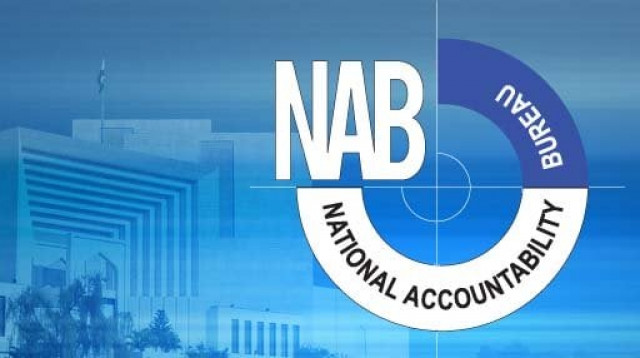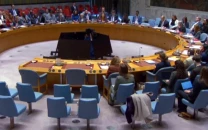New NAB law entails punishment for ‘false case’
Person responsible shall be punished with up to five-year imprisonment

The National Accountability (Amendment) Bill 2022, which was approved during the joint parliament session, encompasses punishment for the person responsible for initiating false case against anyone.
Amendment to Section 36 says: "If the accused has been acquitted by the court on the ground that the case was initiated with mala fide intention or based on false or fabricated evidence, the person responsible shall be punished with imprisonment of either description for a term which may extend to five years and shall also be liable to fine."
Likewise, the new amendment in the NAB law also restricted issuance of public statements. "No official of NAB, in any capacity shall make any statement in public or media regarding person involved in any inquiry or investigation conducted by NAB until a reference has been filed against such person," says Section 33F, which is inserted in the accountability law.
In case of giving a public statement, the NAB official could be punished for a minimum one month and a fine of one million rupees.
The most significant amendment is being made in Section 24 of NAO 1999 which regulates NAB chairman’s power of arrest.
The NAB chairman’s power of arrest was widely misused in the past. It is mentioned that the chairman may issue arrest warrant during investigation if the accused is intentionally or willfully not joining the investigation after repeated notice, the accused attempted to abscond, if there are sufficient grounds that the accused may tamper with the prosecution evidence and if there is sufficient information regarding repetition of continuation of offence under this ordinance. Likewise, NAB could detain the accused for 14 days during investigation. Earlier, NAB could detain the accused person for 90 days.
Regarding the removal of the NAB chairman, it is mentioned that he shall not be removed from office “except on the grounds and in the manner as provided in Article 209 of the Constitution”.
However, one section of the lawyers believe that the government did not completely resolve ambiguity by not clearly mentioning the word “forum” in the fresh amendment for removal of the NAB chairman.
Since the establishment of NAB law, there was ambiguity about the forum to try NAB chairman. The previous government through an ordinance had authorised the president of the country to remove the NAB chairman on account of misconduct.
However, several lawyers say that the words “in the manner as provided under Article 209” establish that the Supreme Judicial Council would be the forum to initiate proceedings against the NAB chairman.
Former additional attorney general Waqar Rana believes that there is no legislative power vested in parliament under the Constitution to confer power of removal on the SJC. "It is not a constitutional office. NAB is an investigation agency and like other executive agencies it is bound to be subservient to the Federal Government," he added.
Read NAB officials told to declare their assets
Apprehensions:
During the hearing of a suo motu case on June 3, Chief Justice of Pakistan Umar Ata Bandial observed that they would examine the new amendments in the NAB law. He said that they could not ignore any move to minimise the role of NAB.
Following these observations, it is clearly reflected that the apex court would examine the amendments. Once again, composition of the bench will be significant to decide the fate of these 27 amendments brought by coalition government led by the PML-N.
Senior lawyers believe that the SC may examine whether parliament has the authority to give effect of these amendments from 1985. Likewise, they say that the meaning given to benami could also be examined.
Advocate Ahsaan Ahmad Khokhar stated that despite the fact that the president returned the bill, amending the NAO, 1999 (XVIII of 1999), it was again passed by parliament in a joint session under Article 75 (2) of the Constitution with majority and after its presentation again to the president, he shall give his assent within 10 days, failing which such assent shall be deemed to have been given.
He said that 28 amendments have been made in the NAO which almost touched all important sections of NAB law and some are very important which include the definition of certain clauses of NAB sections, appointment and tenure of the NAB chairman, jurisdiction and cognisance of NAB, role of prosecutor general, case management and trial of offences, arrest, investigation, inquiry and remand of accused, tender of pardon, approval of the State Bank of Pakistan in banking matters and restriction on issuance of public statements and many others.
Khokhar further said that there is no doubt that there has been consistent demand from various quarters, including all political parties, and there has been some observations and judgments of superior courts regarding NAB’s working and prosecution.
According to a legal expert, parliament tried to address many issues through these amendments relating to NAB’s working and prosecution, adding that certainly there are some good amendments also. He said some of them include appointment and tenure of NAB chairman, jurisdiction and cognisance of NAB, role of NAB prosecutor general, case management and trial of offences, arrest, investigation, inquiry and remand of accused, tender of pardon, willful default, approval of the SBP in banking matters, tenure security of accountability court judge, quantum of offence for public at large and restriction on issuance of public statements, bail-granting power to accountability court and filing of appeal mechanism against accountability court judgment. One the main amendments, he said, is if the accused has been acquitted by the court on the ground that the case was initiated with mala fide intention or based on false or fabricated evidence, the person responsible shall be punished with imprisonment of either description for a term which may extend to five years and shall also be liable to fine.
However, according to him, there are some amendments introduced in the current NAB law which might receive great difference of opinions from various quarters and can have a chance of being challenged in constitutional courts for their final determination that the proposed amended act shall come into force at once and shall be deemed to have taken effect on and from commencement of the NAO, 1999, the definitions and application of corruption and corrupt practices and the applicability of the definition of Benamidar and that that the convict shall be entitled to benefit under Section 382-B of the Code.
Khokhar said it was also important for the future credibility of NAB as an institution that some amendments be introduced that NAB should act as a commission and not under the authority of one man and work vigorously as well as with a group of professional experts for improving governance, rectifying systemic issues which are the root causes and responsible for corruption and corrupt practices like other similar agencies do in the world.


















COMMENTS
Comments are moderated and generally will be posted if they are on-topic and not abusive.
For more information, please see our Comments FAQ